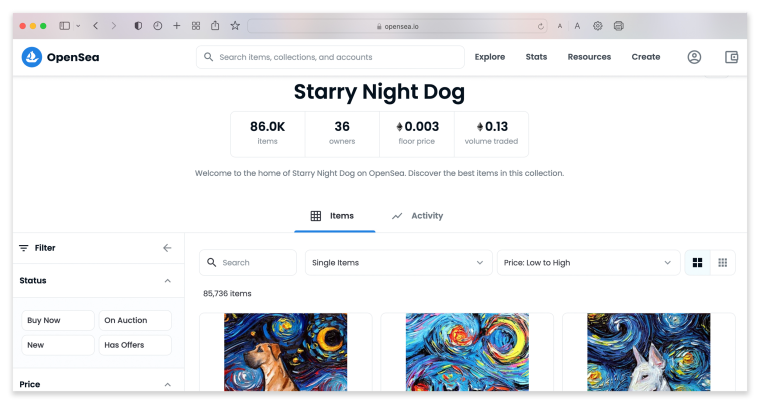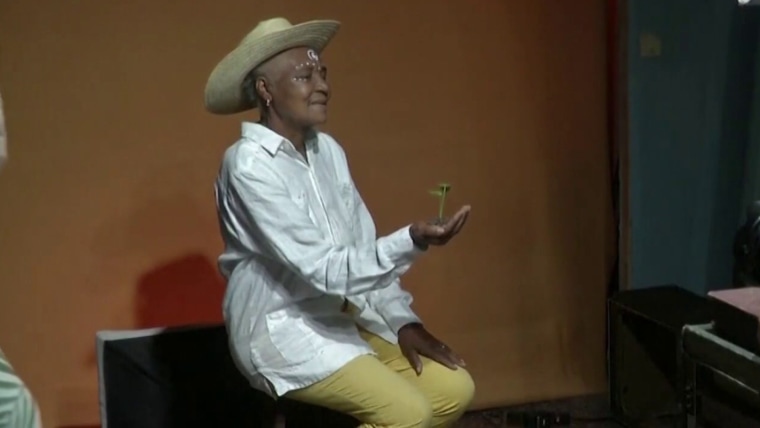13/01/2022 NFT art sales are booming. Just without some artists' permission.
NFTs were hyped as a way to make sure artists get paid for their work. Now, many creators are struggling to stop a wave of piracy.

Digital thieves had stolen from Aja Trier before.
Trier, a painter in San Antonio, often riffs on Vincent van Gogh’s “Starry Night,” adding dogs or dinosaurs to it, or reimagining it as a desert landscape or Mordor from “Lord of the Rings.” She sells versions on mugs and mouse pads and pillows, and over the years she’s caught and stopped people selling pirated versions of her work on Amazon and other online marketplaces.
But thanks to the explosion of the NFT art market, thieves have started stealing her work at a jaw-dropping rate. Last week, an unidentified user on OpenSea, the dominant marketplace for the burgeoning NFT art market, started putting tens of thousands of listings of her work, often duplicates, up for sale. Thirty-seven of them sold before she was able to convince the platform to take them down.
“They just kept taking and remaking them as NFTs,” Trier said. “It’s so flagrant. And if it happens to me, it can happen to anyone.”
Trier’s story has already become common in the burgeoning world of NFT art sales. RJ Palmer, a San Francisco artist who designs creatures and monsters both as commissioned digital works and for movies and video game companies, said issuing takedown requests to NFT platforms for his work became a daily routine before he eventually gave up.
“It got to be too many. It became this part of my day,” Palmer said, adding that he would constantly send emails trying to get NFTs taken down. “This is putting so much work on me. I just don’t want to deal with it.”
As the NFT art market takes off, systems to ensure a buyer is making a legitimate purchase of digital ownership have failed to keep up. Anonymous thieves now regularly steal whatever digital art they can find online and pass it off as their own to sell. While NFT proponents tout the technology as a way torevolutionize arts patronage, the rapidly growing digital marketplaces that enable those sales have so far done little to stop that piracy.

NFTs, short for nonfungible tokens, have exploded as a new kind of art market in the past two years, promising a way for people to prove they own a digital asset. Rooted in the same blockchain technology as cryptocurrencies like Bitcoin and Ethereum, NFTs have been called everything from “a geeky implementation of bragging rights” todigital certificates of authenticity.
Actors, musicians, athletesand evenpolitical campaignshave jumped into the space, issuing all manner of NFT-connected digital knickknacks. NFT trading volume grew rapidly, hitting $10.7 billion in the third quarter of 2021,according to analytics platform DappRadar.
In the art world, NFTs were quickly hyped as solving a variety of problems. They offered a way for artists to monetize digital art, ensure they could sell their work and even make money if their art were sold in the future. NFTs are not art themselves but rather digital deeds, certificates that can be associated with a piece of art and then bought and sold as representative of ownership.
But rapid growth has also opened the door for rampant piracy and fraud. On most NFT platforms including OpenSea, by far the largest NFT marketplace, people can create an account and start selling whatever digital images they want to upload. While that’s helped OpenSea grow rapidly (the companyannounced Tuesdayit had been valued at $13.3 billion in a recent funding round), the platform is barely moderated, forcing artists to actively patrol OpenSea and its competitors to try to get their work taken down.
In an emailed statement, an OpenSea spokesperson said, “We take theft seriously and have policies in place to meet our obligations to the community and deter theft on our platform,” and the company is “actively expanding our efforts across customer support, trust and safety, and site integrity.”
While there is little data to illustrate exactly how common the problem is, there are some indications it’s widespread. One comes from DeviantArt, one of the internet’s largest digital art platforms, which has started constantly scanning blockchains used by NFTs to alert users when copies of their work are shown on NFT exchanges. DeviantArt has sent alerts to thousands of artists since September, Liat Gurwicz, the company’s chief marketing officer, said.
Alerts from DeviantArt to Aja Trier that someone had made an NFT of her work.Aja Trier“Art theft is nothing new. We’re just seeing it at a completely new scale with everything that’s happened with NFTs,” Gurwicz said. Artists have to take matters into their own hands to get their work taken down, she said.
“Right now, we are not aware of other solutions that artists can use,” she said.
Currently, OpenSea’s process to take down sales of stolen images puts most of the onus on the artists. A seller doesn’t need to provide proof of ownership or use their real name to start an auction, but an artist filing a copyright notice has to share personal information like their real name and links that prove they’re the real owner of a work.
Ashli Weiss, a Silicon Valley lawyer who haspublished a guidefor how to send copyright notices to NFT marketplaces, said the burden on artists is exacerbated by the fact that many NFT thieves appear to be automated bots.
“These bots are not looking just for NFT art that’s already been minted and they’re trying to resell it,” Weiss said. “They’re going after artists who don’t even know what an NFT is, and that honestly is probably making the counterfeit sellers a lot more money because they don’t have people taking their work down.”
Even though OpenSea tends to respond to takedown requests, the actual idea of copyright in the NFT space is tricky, said Brian Frye, a professor of intellectual property law at the University of Kentucky who has sold his own art as NFTs.
Since an NFT isn’t an actual image, but rather a receipt or digital deed that points to an image, its sale wouldn’t violate an artist’s copyright, he said. Only the image uploaded to and hosted on OpenSea would.
“All [an NFT] is, is a URL saying ‘Look at this place on the internet,’” Frye said.
“Telling somebody to look at this URL, there’s no copyright infringement there, because no original copyright-protected element of anything is being copied,” he said. “So the NFT itself is just irrelevant to the question.”
 (0)
(0)
 (0)
(0)
https://www.nbcnews.com/tech/security/nft-art-sales-are-booming-just-artists-permission-rcna10798
